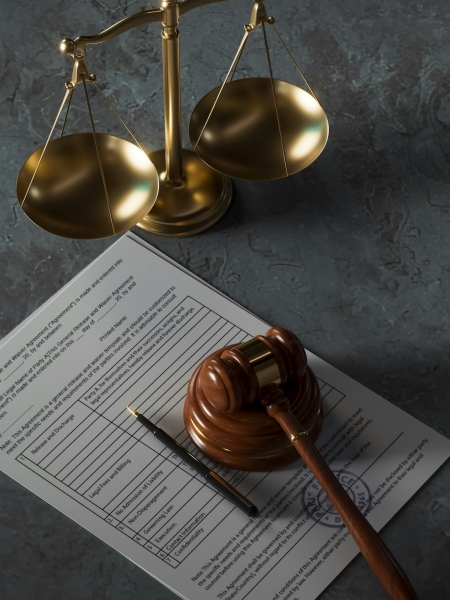Can I Sue My Former Jail? Legal Rights While Incarcerated

It’s one of the things that scares people with little or no experience in jail the most. That while sitting in a jail cell minding their own business while the bail bond agent works to secure their release, they will be targeted and beaten up. Violence in prisons and jails is no myth, and those who seem out of place are often the most common targets. This raises the question: can you sue if you get beat up in jail while awaiting release on bail?
Likelihood of a Successful Lawsuit

If you decide to file a lawsuit against the jail for not protecting you, the odds of success are not great. Prisons are not responsible for the quality of the people that end up there; their job is to process and prevent escapes.
However, there are situations where the jail could be negligent. For instance, if guards knowingly allowed someone into the same cell with you who had a history of assault or if the staff witnessed the assault and did nothing to stop it, you may have a case. Evidence of jail personnel assaulting you could also provide grounds for a lawsuit.
Type of Attorney to Call
If you’re arrested and later assaulted, you may need two lawyers: one for the case resulting from your arrest and another to handle the assault. For the assault case, consider hiring a civil rights attorney with experience in similar cases, as you’re alleging that jail staff violated your rights.
Alternatively, a personal injury attorney might be helpful, as they have experience handling cases involving difficult defendants. The most important thing is to hire an attorney with relevant experience, preferably one who has had success with similar cases.
“Civil rights attorneys can help victims of prison abuse and jail neglect to file a civil rights lawsuit.”
—Shouse Law Group
Your Constitutional Rights When Incarcerated
Despite being arrested and placed in jail, you retain certain constitutional rights. However, some rights are limited in jail or prison. Here are the key ones often affected by incarceration:
| Amendment | Summary of Rights | Effect While Incarcerated |
|---|---|---|
| The First Amendment | Protects the right to free speech, religion, assembly, and petitioning the government. | While incarcerated, prisoners retain the right to free speech and religion, but these rights are often restricted in practice, especially concerning extreme religious practices and the right to assemble. The right to petition the government is often used for lawsuits. |
| The Second Amendment | Guarantees the right to keep and bear arms. | The Second Amendment is suspended at the entrance of jail or prison. Inmates are not permitted to possess firearms or weapons during incarceration. |
| The Fourth Amendment | Protects against unreasonable searches and seizures. | Incarcerated individuals have no expectation of privacy. Jail personnel can search inmates and their cells without needing a warrant or probable cause. |
| The Sixth Amendment | Guarantees the right to a speedy trial, an impartial jury, and legal representation. | While incarcerated, this right is upheld for those awaiting trial or facing charges. However, delays and limited access to legal resources can impede the exercise of this right. |
| The Eighth Amendment | Prohibits cruel and unusual punishment. | This amendment still protects inmates from excessive force, abuse, or cruel conditions, but what is considered “cruel and unusual” may be interpreted differently depending on the circumstances of incarceration. |
In short, constitutional rights are limited upon incarceration, except for the right to affordable bail bonds, which remains protected.
Watch the following video for more details on the constitutional rights Americans retain while incarcerated.
FAQs on Legal Rights While Incarcerated
Yes, you can file a lawsuit if you believe your constitutional rights have been violated, such as being subjected to excessive force or mistreatment by jail staff. It’s important to gather evidence and consult with an attorney experienced in civil rights cases.
In most cases, if you’re incarcerated and have not been convicted of a felony, you can retain your voting rights. However, rules vary by state, and individuals convicted of felonies may lose their voting rights for a period.
Yes, you can potentially sue if you receive inadequate medical care in jail. The Eighth Amendment protects you from cruel and unusual punishment, which includes the denial of necessary medical treatment.
Yes, inmates have the right to practice their religion, but this right may be limited by security concerns and the practicalities of jail or prison life. These limitations are typically evaluated on a case-by-case basis.
While inmates can be placed in solitary confinement for disciplinary reasons, prolonged solitary confinement can be considered cruel and unusual punishment if it leads to mental harm. You may have grounds to challenge this if it violates your rights.
Yes, incarcerated individuals have the right to access legal resources, including legal libraries and communication with attorneys. This is crucial for ensuring your right to a fair trial and ongoing legal proceedings.
If your civil rights are violated, such as being subjected to unnecessary punishment or discrimination, you can file a lawsuit under Section 1983 of the Civil Rights Act. It’s vital to document everything and consult an attorney.
While incarcerated individuals may be required to work, especially in prison, work conditions must meet certain standards. If forced labor or exploitation occurs, you may have grounds for a legal challenge.
Preparing to File a Lawsuit Against a Jail
If you’ve been assaulted and believe it’s the fault of jail officials, hiring the right attorney is essential. Look for an attorney with experience in this type of lawsuit, and preferably one who has won similar cases.
“Jail and prison officials must follow state and federal laws in their treatment of inmates. If they violate your rights, you can sue them to change their practices or sue for damages in cases of injuries. Taking the proper steps in doing so is critical to your success.”
—Commonwealth Law Group

Before filing your lawsuit, take the following steps to fully prepare for the legal battle ahead.
- Gather Evidence — Recall the exact time, circumstances, and any jail staff who allowed or witnessed the assault. Also, note the names of others in your cell. Surveillance footage can be valuable, but it may be erased, so try to document everything while you can.
- Collect Testimonies and Statements — If you’ve heard from others that the jail has a history of violence or mistreatment, this could strengthen your case. Testimonies from fellow inmates or staff who are aware of the situation are critical.
- Determine the Correct Jurisdiction — Identify the proper court for filing your lawsuit. If the case involves federal issues, such as violations of the Americans With Disabilities Act, file in federal court. For state law violations, file in the appropriate state court. Be mindful of the statute of limitations to ensure timely filing.
- File an Administrative Complaint — Before you can proceed with a lawsuit, many municipalities require filing an administrative complaint. This process involves hearings, and it’s essential to follow all steps to avoid having your lawsuit dismissed.
- Consult an Experienced Attorney — Seek out an attorney with experience handling civil rights or personal injury cases, especially those involving jail conditions. Their expertise will guide you through the complex legal processes and increase your chances of a successful outcome.
- Prepare for the Legal Process — After exhausting the administrative complaint process, you can file your lawsuit. Work closely with your attorney to build a strong case. Understand that the chances of success may vary, but pursuing legal action is always a potential path for justice.
The Bottom Line
If you or a loved one find themselves in jail don’t wait, call Urban Bail Bonds immediately at (303) 736-2275 for 24 hour bail bonds. We’ll have you out of there as quickly as possible.
